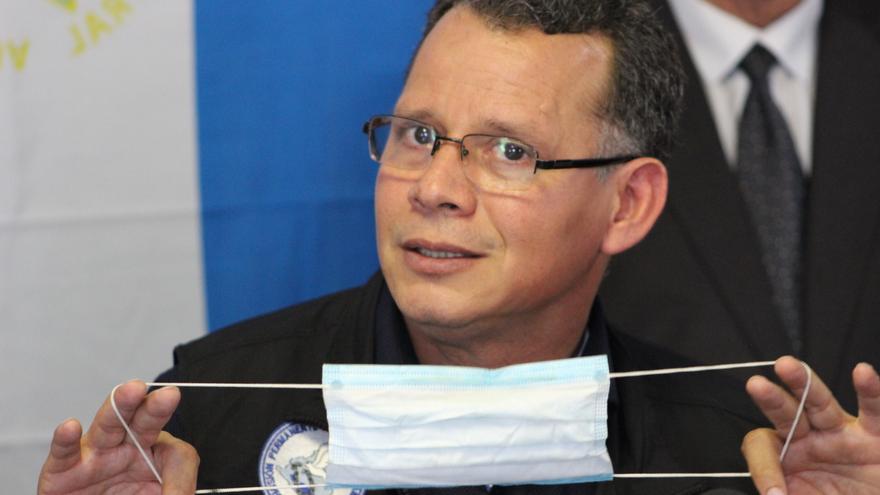
![]() 14ymedio, Mario J. Pentón, Miami, 30 May, 2018 — Representatives of the Cuban exile in Miami joined their voices with those of Venezuelan and Nicaraguan exiles to ask for an end to the murders of young students in Nicaragua, where there have been intense social protests for more than a month.
14ymedio, Mario J. Pentón, Miami, 30 May, 2018 — Representatives of the Cuban exile in Miami joined their voices with those of Venezuelan and Nicaraguan exiles to ask for an end to the murders of young students in Nicaragua, where there have been intense social protests for more than a month.
In a press conference sponsored by the Democracy Movement in Miami, Denis Darce, member of the Permanent Commission on Human Rights in Nicaragua (CPDH) explained that the number of murders during anti-government protests amounts to 91 and more than 100 people have been tortured.
Darce, a sociologist by profession, also said that they have documented at least a dozen disappearances.
“Today we are celebrating Mother’s Day in Nicaragua, but today is a day of mourning,” he said, adding that “right now, for the Government and the Nicaraguan State being young is a sin.”
According to this representative of the NGO founded during the Somoza dictatorship in 1977, the government of Daniel Ortega promotes hatred through institutions and uses state resources to transport vigilante gangs to repress protesters.
Since April 18 when the country erupted in protests against the president and his wife, Vice President Rosario Murillo, numerous international organizations such as the Inter-American Commission on Human Rights (IACHR) have reported allegations of torture, murder and disappearances.
“We are overwhelmed by the situation,” acknowledged Darce, who revealed that his organization is trying to coordinate a tour for a group of mothers through the main hospitals and morgues in the country where “there are bodies that are about to be incinerated without having allowed a process for family members to identify them.”
Darce said that his NGO is preparing a presentation before the Truth Commission set up by the ruling party, although he acknowledged that “the families, the victims and the majority of the Nicaraguan people do not trust that institution created by the State.” According to him, the solution would be to create another Truth Commission with international participation through the IACHR and the Human Rights Committee of the United Nations.
“We have reports of communication professionals, state workers who have been fired for “liking” a post on Facebook, contrary to government policy,” explained Darce, who called on the Nicaraguan population to report to the competent bodies violations of human rights in the country.
His voice breaking from emotion, Darce reported some of the testimonies received by his organization. “The body of the son of a lady from Ciudad Sandino was found cut into pieces. We have the case of a boy from the Cuesta del Plomo who was found dead recently: his friends testify that he was arrested by the police forces and was found with signs of torture.”
Inventing the supposed burning of institutions and falsifying the identity of the mothers of the deceased so that they give statements to the media, together with death certificates that are not consistent with the reasons for the deaths, are some of the government’s procedures denounced by Darce.
“Although there is an open dialogue, the actions of the Government have not ceased either in repression or in violence. Quite the opposite. It has developed a whole plan of terror and anxiety toward the Nicaraguan population,” he added and reported several attempts to poison the protesters.
Darce demanded that the State of Nicaragua sign The International Convention for the Protection of All Persons from Enforced Disappearance and The Rome Statute of the International Criminal Court as a guarantee that events such as those reported by the CPDH do not continue. “The dictatorship of Nicaragua is not 10 years old, it is a dictatorship of almost 40 years, which began in 1979 and continued in the 90s and is now consolidated,” he said.
The CPDH plans to present the Nicaraguan situation to the General Assembly of the Organization of American States in Washington from June 3 to 5. They also intend to visit US Congressional Representatives to pressure the Government of Managua and bring representatives of the victims to appear before the OAS.
Cuban-American congresswoman Ileana Ros-Lehtinen spoke via Twitter about the situation in Nicaragua. “One more death at Ortega’s hands is added simply because he refuses to leave power. The US must punish those responsible for the bloodshed,” Ros-Lehtinen tweeted. She is known for her critical positions toward leftist governments in the region aligned with Havana.
For his part, José Colina, president of the association of Persecuted Political Venezuelans in Exile called for sanctions and pressure on the Nicaraguan government, which in his opinion, is following the same script as Maduro followed during the student protests of 2015.
Representatives of Nicaraguan civil society in Miami summoned all their compatriots and supporters of the cause of the insurgents to demonstrate in front of the Nicaraguan consulate in Miami (1332 W Flagler St, Miami, FL 33135). “We want justice and democracy for our country,” said María Belén Ruiz, of the Nicas Unidos Movement in Miami.
“Nicaragua had its throat tied. They [the students] had value and have paid with their lives to tell the world about the atrocities that we have been experiencing for a long time,” said Raquel Pineda, a young Nicaraguan resident in Miami.
_______________________________
The 14ymedio team is committed to serious journalism that reflects the reality of deep Cuba. Thank you for joining us on this long road. We invite you to continue supporting us, but this time by becoming a member of 14ymedio. Together we can continue to transform journalism in Cuba.
